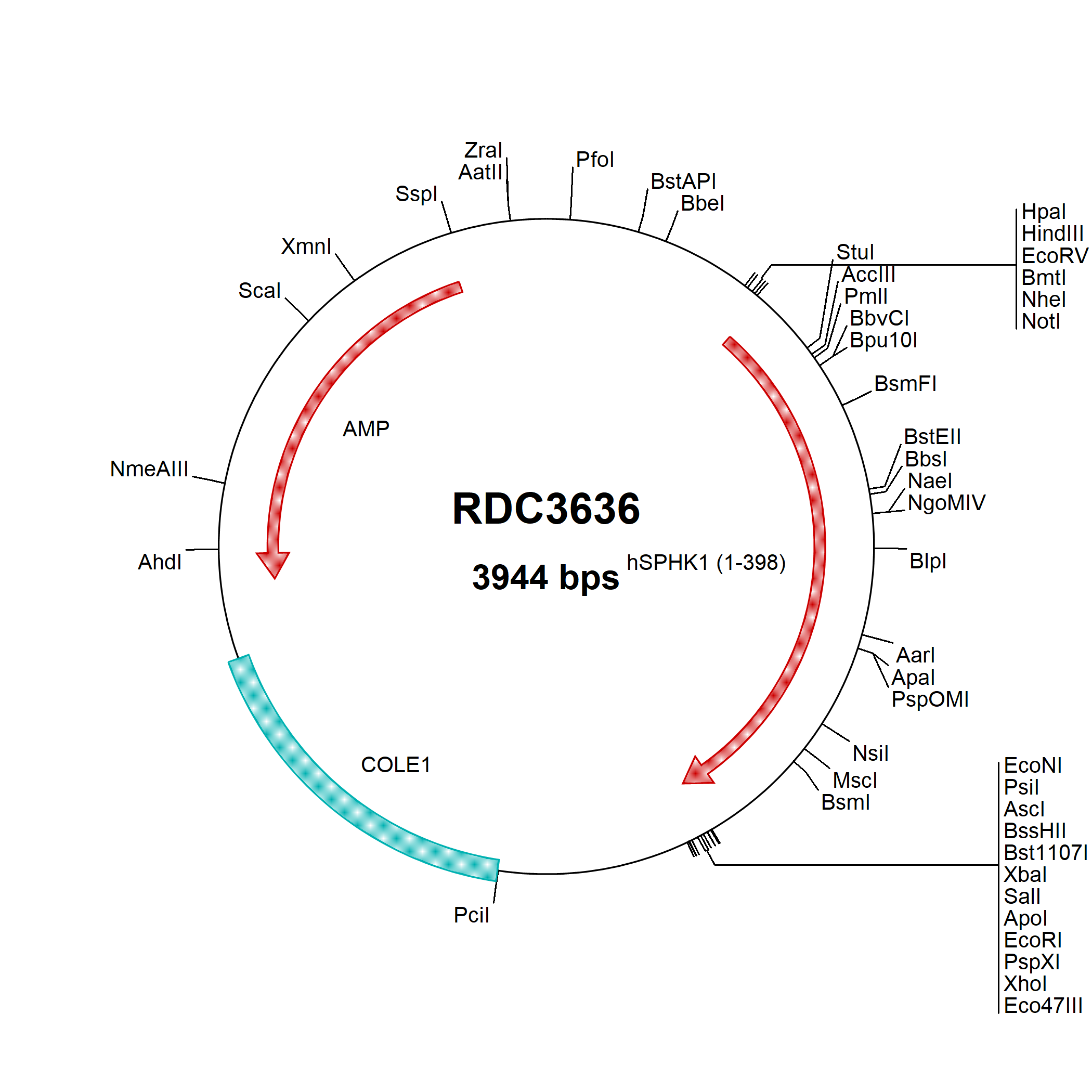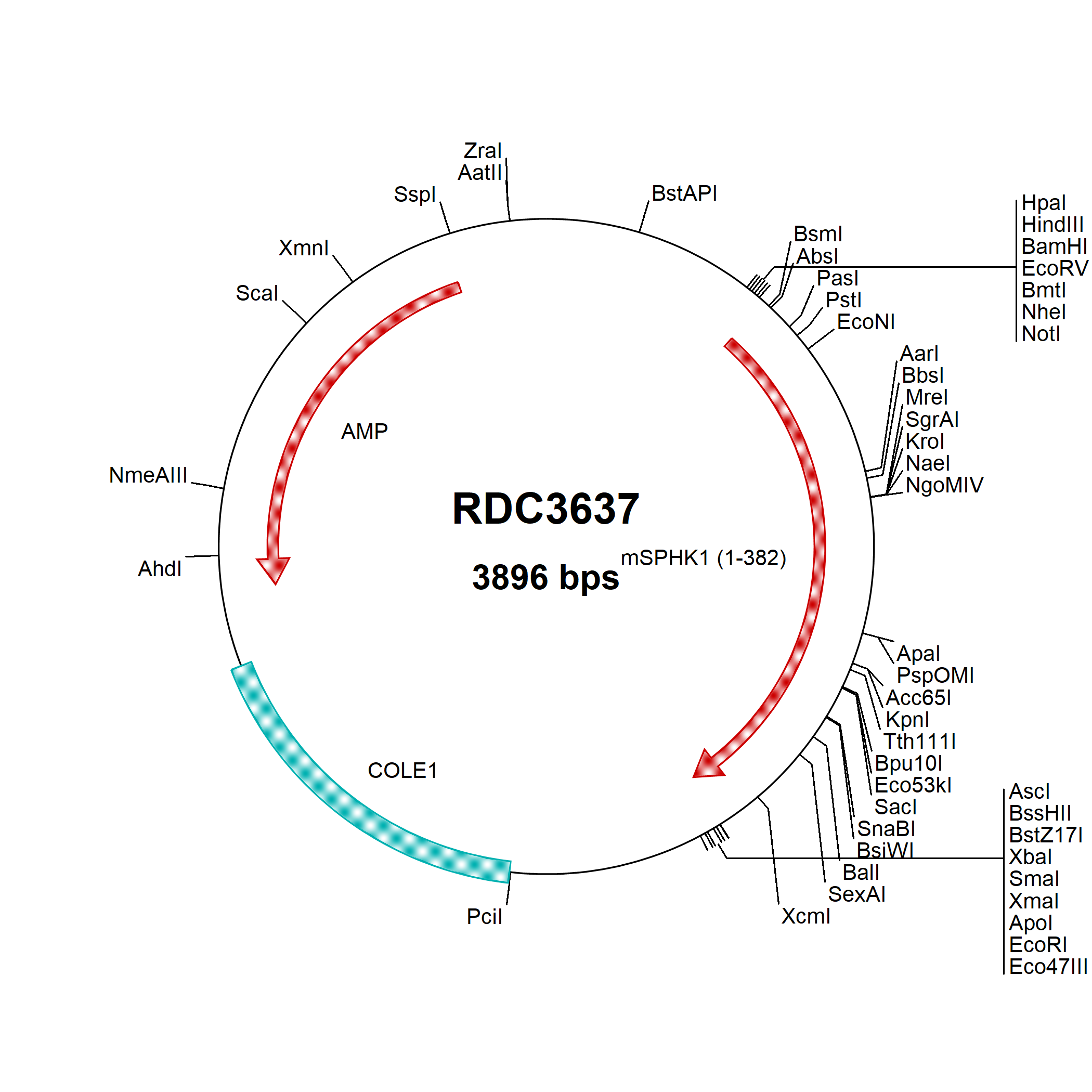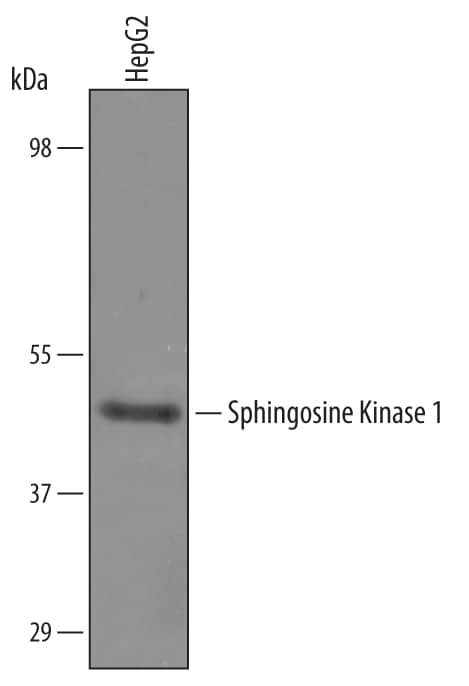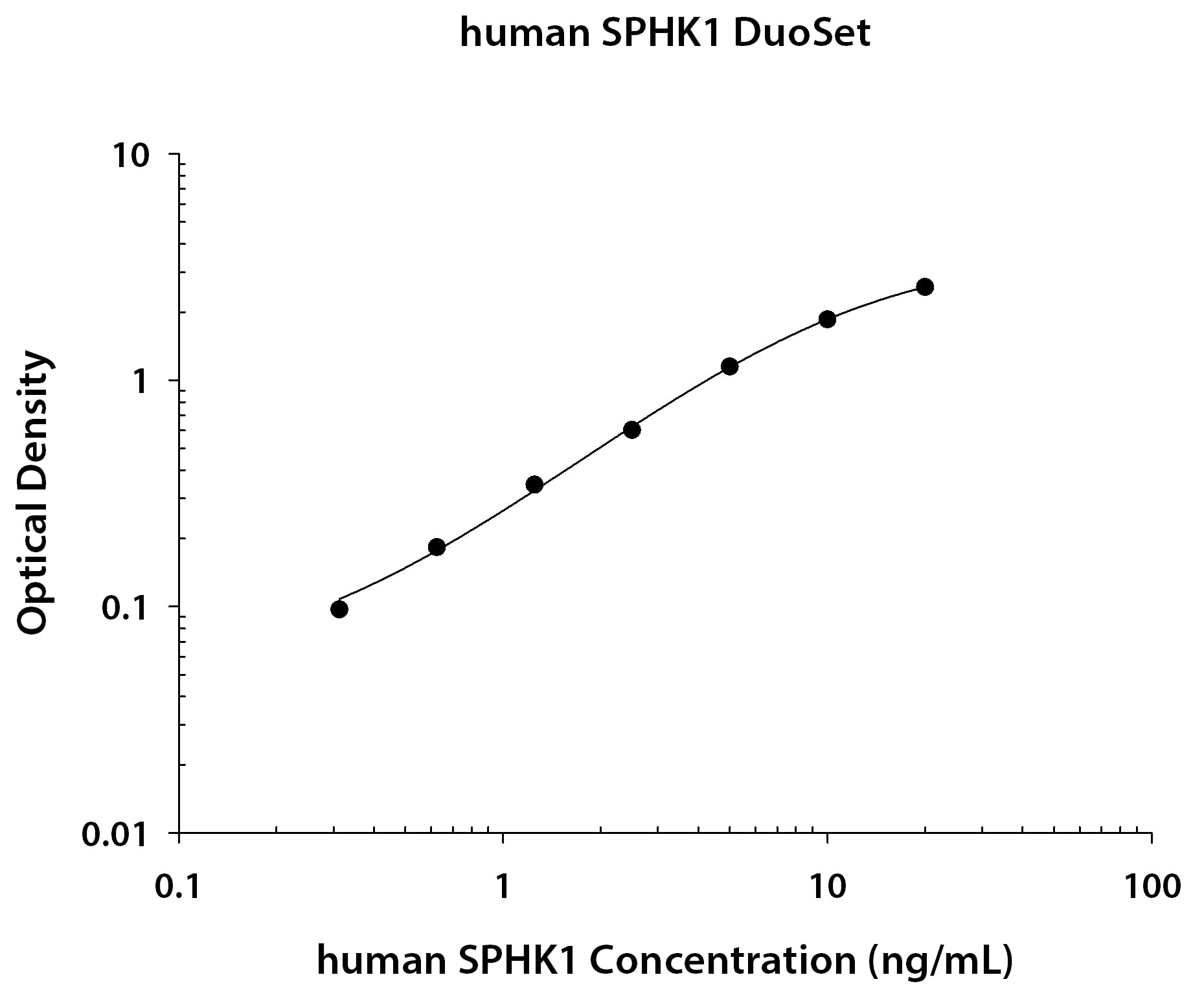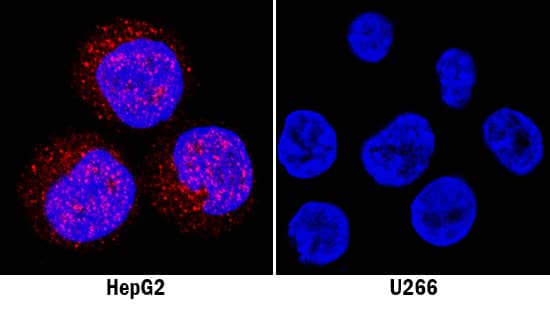Sphingosine Kinase 1/SPHK1 Products
Sphingosine kinases are cytosolic or membrane-associated enzymes that catalyze the phosphorylation of sphingosine to sphingosine-1-phosphate (S1P). Two types of sphingosine kinases, SPHK1 and SPHK2, are known to be expressed in human cells. The two enzymes share considerable amino acid sequence similarity, but differ in their N-terminal and central regions. The two proteins also differ in tissue distribution and some kinetic properties. S1P is a lipid messenger that regulates diverse physiological processes including cell proliferation, migration, apoptosis, inflammation, calcium homeostasis and cytoskeletal structure. The level of S1P is tightly controlled by SPHKs and S1P degrading enzymes. SPHK1 and its activation can be stimulated by several growth factors such as tumor necrosis factor-alpha, epidermal growth factor and transforming growth factor-beta. Expression of SPHK1 has been found to increase in many human solid tumors and overexpression of SPHK1 is associated with tumor angiogenesis. Such studies have implicated SPHK1 as a new target for cancer treatment.
60 results for "Sphingosine Kinase 1/SPHK1" in Products
60 results for "Sphingosine Kinase 1/SPHK1" in Products
Sphingosine Kinase 1/SPHK1 Products
Sphingosine kinases are cytosolic or membrane-associated enzymes that catalyze the phosphorylation of sphingosine to sphingosine-1-phosphate (S1P). Two types of sphingosine kinases, SPHK1 and SPHK2, are known to be expressed in human cells. The two enzymes share considerable amino acid sequence similarity, but differ in their N-terminal and central regions. The two proteins also differ in tissue distribution and some kinetic properties. S1P is a lipid messenger that regulates diverse physiological processes including cell proliferation, migration, apoptosis, inflammation, calcium homeostasis and cytoskeletal structure. The level of S1P is tightly controlled by SPHKs and S1P degrading enzymes. SPHK1 and its activation can be stimulated by several growth factors such as tumor necrosis factor-alpha, epidermal growth factor and transforming growth factor-beta. Expression of SPHK1 has been found to increase in many human solid tumors and overexpression of SPHK1 is associated with tumor angiogenesis. Such studies have implicated SPHK1 as a new target for cancer treatment.
| Reactivity: | Human |
| Details: | Mouse IgG2a Kappa Monoclonal Clone #1D6 |
| Applications: | IHC, WB, ELISA, ICC/IF |
| Reactivity: | Human, Rat |
| Details: | Rabbit IgG Polyclonal |
| Applications: | WB, ICC/IF, IP |
| Reactivity: | Human, Monkey |
| Details: | Rabbit IgG Polyclonal |
| Applications: | IHC |
| Source: | Sf 21 (baculovirus) |
| Accession #: | NP_068807 |
| Applications: | EnzAct |
| Reactivity: | Human, Rat, Monkey |
| Details: | Mouse IgG2A Monoclonal Clone #OTI1A6 |
| Applications: | IHC, WB, ICC/IF |
Recombinant Monoclonal Antibody.
| Reactivity: | Human |
| Details: | Rabbit IgG Monoclonal Clone #JA31-14 |
| Applications: | IHC, WB, Flow |
| Source: | Sf 21 (baculovirus) |
| Accession #: | Q8CI15 |
| Applications: | EnzAct |
| Reactivity: | Human |
| Details: | Rabbit IgG Polyclonal |
| Applications: | WB, ICC/IF |
| Reactivity: | Human, Rat |
| Details: | Rabbit IgG Polyclonal |
| Applications: | WB, ICC/IF, IP |
| Reactivity: | Human, Mouse, Rat, Bovine |
| Details: | Rabbit IgG Polyclonal |
| Applications: | WB, ELISA |
| Applications: | WB |
| Reactivity: | Human |
| Details: | Rabbit IgG Polyclonal |
| Applications: | IP |
| Reactivity: | Human, Rat |
| Details: | Rabbit IgG Polyclonal |
| Applications: | WB, ICC/IF, IP |
| Reactivity: | Human, Rat |
| Details: | Rabbit IgG Polyclonal |
| Applications: | WB, ICC/IF, IP |
| Reactivity: | Human, Rat, Monkey |
| Details: | Mouse IgG2A Monoclonal Clone #OTI1A6 |
| Applications: | IHC, WB, ICC/IF |
| Reactivity: | Human, Rat, Monkey |
| Details: | Mouse IgG2A Monoclonal Clone #OTI1A6 |
| Applications: | IHC, WB, ICC/IF |
| Reactivity: | Human |
| Details: | Sheep IgG Polyclonal |
| Applications: | WB, ELISA, IHC, IP, ICC |
| Reactivity: | Human |
| Details: | Mouse IgG1 Monoclonal Clone #647706 |
| Applications: | ELISA |
| Reactivity: | Human |
| Details: | Mouse IgG2b Monoclonal Clone #647705 |
| Applications: | ICC |
| Reactivity: | Human, Rat, Monkey |
| Details: | Mouse IgG2A Monoclonal Clone #OTI1A6 |
| Applications: | IHC, WB, ICC/IF |
| Reactivity: | Human, Rat, Monkey |
| Details: | Mouse IgG2A Monoclonal Clone #OTI1A6 |
| Applications: | IHC, WB, ICC/IF |
| Reactivity: | Human, Rat, Monkey |
| Details: | Mouse IgG2A Monoclonal Clone #OTI1A6 |
| Applications: | IHC, WB, ICC/IF |
| Reactivity: | Human, Rat, Monkey |
| Details: | Mouse IgG2A Monoclonal Clone #OTI1A6 |
| Applications: | IHC, WB, ICC/IF |

![Western Blot: Sphingosine Kinase 1/SPHK1 Antibody (1D6) [H00008877-M01] Western Blot: Sphingosine Kinase 1/SPHK1 Antibody (1D6) [H00008877-M01]](https://resources.bio-techne.com/images/products/Sphingosine-Kinase-1-SPHK1-Antibody-1D6-Western-Blot-H00008877-M01-img0005.jpg)

![Immunohistochemistry-Paraffin: Sphingosine Kinase 1/SPHK1 Antibody - BSA Free [NB110-40449] Immunohistochemistry-Paraffin: Sphingosine Kinase 1/SPHK1 Antibody - BSA Free [NB110-40449]](https://resources.bio-techne.com/images/products/Sphingosine-Kinase-1-SPHK1-Antibody---BSA-Free-Immunohistochemistry-Paraffin-NB110-40449-img0001.jpg)


![Western Blot: Sphingosine Kinase 1/SPHK1 Antibody (OTI1A6) [NBP2-45944] Western Blot: Sphingosine Kinase 1/SPHK1 Antibody (OTI1A6) [NBP2-45944]](https://resources.bio-techne.com/images/products/Sphingosine-Kinase-1-SPHK1-Antibody-1A6-Western-Blot-NBP2-45944-img0005.jpg)
![Western Blot: Sphingosine Kinase 1/SPHK1 Antibody (JA31-14) [NBP2-67164] Western Blot: Sphingosine Kinase 1/SPHK1 Antibody (JA31-14) [NBP2-67164]](https://resources.bio-techne.com/images/products/Sphingosine-Kinase-1-SPHK1-Antibody-JA31-14-Western-Blot-NBP2-67164-img0005.jpg)
![Immunocytochemistry/ Immunofluorescence: Sphingosine Kinase 1/SPHK1 Antibody [NBP2-20472] Immunocytochemistry/ Immunofluorescence: Sphingosine Kinase 1/SPHK1 Antibody [NBP2-20472]](https://resources.bio-techne.com/images/products/Sphingosine-Kinase-1-SPHK1-Antibody-Immunocytochemistry-Immunofluorescence-NBP2-20472-img0003.jpg)
![Western Blot: Sphingosine Kinase 1/SPHK1 Antibody [NBP1-22974] Western Blot: Sphingosine Kinase 1/SPHK1 Antibody [NBP1-22974]](https://resources.bio-techne.com/images/products/Sphingosine-Kinase-1-SPHK1-Antibody-Western-Blot-NBP1-22974-img0002.jpg)
![Western Blot: Sphingosine Kinase 1/SPHK1 Antibody [NBP3-30856] - Sphingosine Kinase 1/SPHK1 Antibody](https://resources.bio-techne.com/images/products/nbp3-30856_rabbit-sphingosine-kinase-1-sphk1-pab-81120242256271.jpg)
![Western Blot: Sphingosine Kinase 1/SPHK1 Overexpression Lysate [NBP2-06490] Western Blot: Sphingosine Kinase 1/SPHK1 Overexpression Lysate [NBP2-06490]](https://resources.bio-techne.com/images/products/Sphingosine-Kinase-1-Overexpression-Lysate-Adult-Normal-Western-Blot-NBP2-06490-img0001.jpg)
![Immunoprecipitation:Sphingosine Kinase 1/SPHK1 AntibodyNBP3-29344] - Sphingosine Kinase 1/SPHK1 Antibody](https://resources.bio-techne.com/images/products/nbp3-29344_rabbit-sphingosine-kinase-1-sphk1-pab-301220241745127.jpg)
